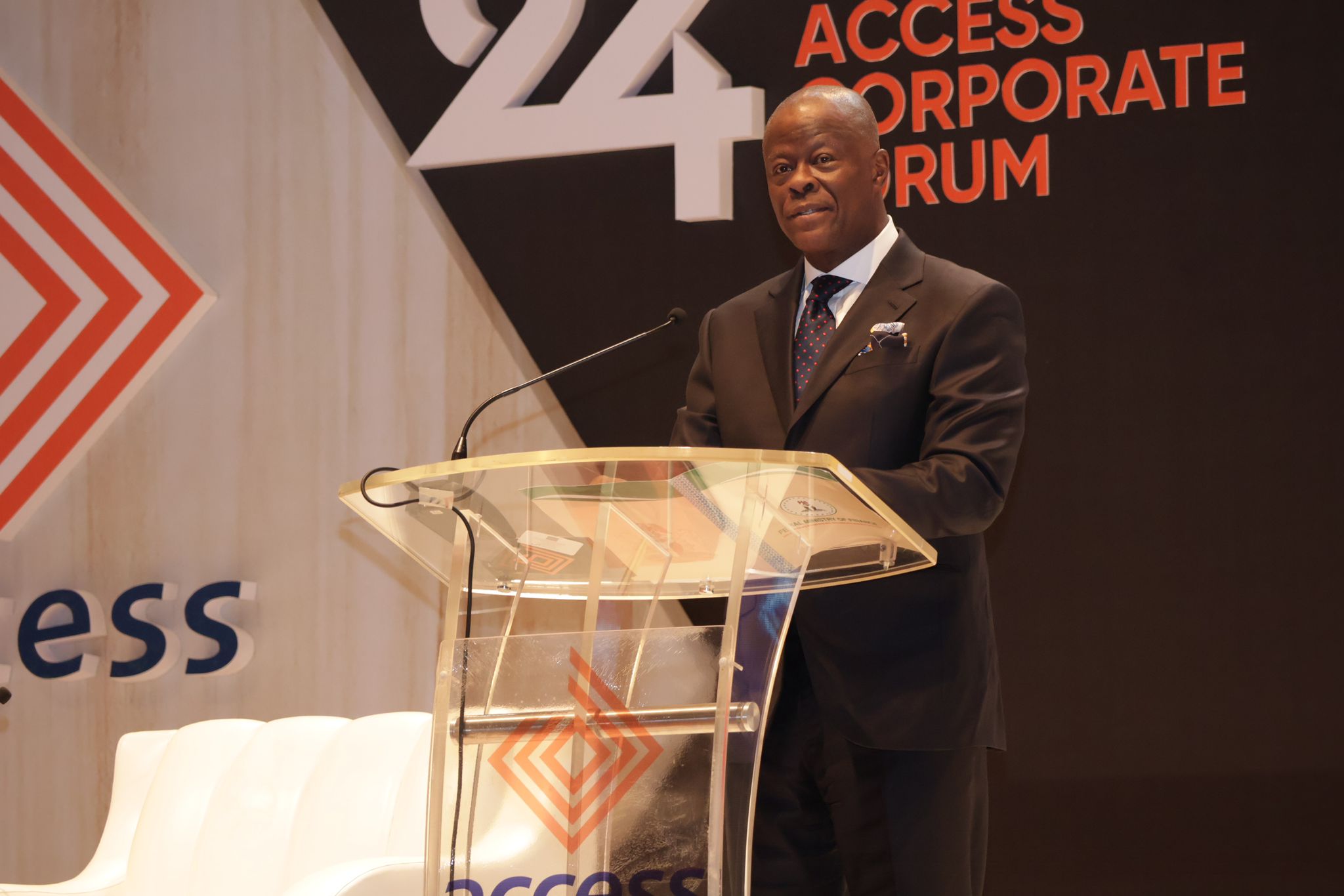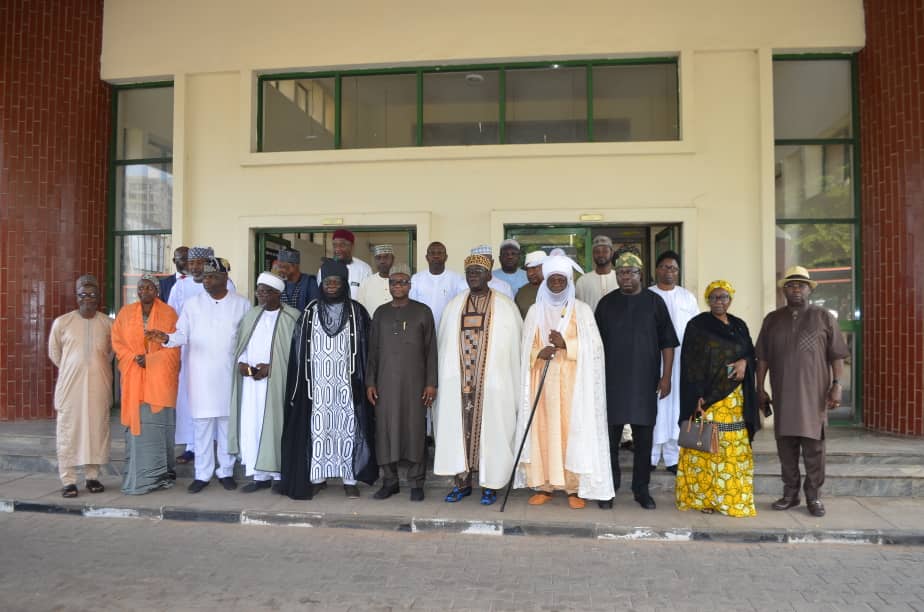Business
Edun Outlines Key Reforms For Nigeria’s Economic Revival

Joel Ajayi
The Honourable Minister of Finance and Coordinating Minister of the Economy, Mr Wale Edun, has outlined key reforms President Bola Ahmed Tinubu’s Administration introduced to stabilize the nation’s economy, reduce poverty, and foster sustainable development.
The Minister disclosed this in his keynote address at Access Bank’s Corporate Customer Forum 2024, held at Eko Hotels in Lagos, on Thursday.
The event, themed: Nigeria’s Economic Rebirth: Hopes and Implications, brought together stakeholders from various sectors to discuss the country’s growth prospects.
HM Edun reported encouraging signs of economic progress, including improvements in GDP growth, stabilized exchange rates, and increased government revenue.
He, however, acknowledged ongoing challenges, such as inflation and foreign exchange pressures, assuring that initiatives like the Accelerated Stabilization and Advancement Program (ASAP), among others, are being implemented to address these issues.
The Minister also detailed plans to boost agricultural production, including a program to support 360,000 farmers, aiming for a yield of 1.4 million metric tons of key crops.
Emphasizing the government’s medium-term priorities, HM Edun called for greater private-sector involvement and underscored the importance of public-private partnerships in key sectors like mining, power, and agriculture to further enhance the economy for the future of our nation
The forum also highlighted Access Bank’s sustainability initiatives, including its commitment to green projects as well as its recent expansion into Kenya.
He commended Access Bank for facilitating crucial discussions on leveraging technology, adopting sustainable practices, and promoting inclusivity to drive Nigeria’s economic progress.
The Minister’s Emphasis on leveraging technology, adopting sustainable practices, and promoting inclusivity will be crucial in driving Nigeria’s economic progress. It will also maximize resources, provide opportunities for job creation, and ultimately pave the way for Nigeria’s economic transformation.
His keynote address at the Access Bank Forum 2024 underscored the government’s unwavering commitment to fostering economic growth and sustainable development in Nigeria. With groundbreaking reforms already underway and a strategic focus on private sector involvement, Nigeria is poised for economic rebirth.
This renewed emphasis on collaboration and private investment is expected to drive economic progress, create jobs, and reduce poverty – a vision that aligns with the federal government’s shift towards leveraging domestic resources and internal revenue generation
Business
Traditional Council Pillars of Stability and Development – RMAFC Chairman

Joel Ajayi
Chairman Revenue Allocation Mobilization And Fiscal Commission Mohamed Bello Shehu OFR, has described the traditional rulers as not only the custodians of tradition and culture but Pillars of Stability and Development in Nigeria.
The Chairman made this remark when some traditional rulers from Nasarawa State, led by His Royal Highness Abdullahi Amegwa, the Osana of Keana paid him a courtesy visit in his office in Abuja.
He said, ” Prior to the colonial era, the system of government that existed in Nigeria was controlled by the traditional rulers in our various societies. The remarkable role they played not only as custodians of culture and traditions but also as development agents in various societies that formed what is known as Nigeria today can not be overemphasized. “
He therefore stressed the need to recognise the rightful position of the royal fathers and accord them a better role that will enable them to perform optimaly.
According to Shehu ” We did not get things right with the Local Government (LG) reforms of 1976 and we did not get it right with the 1999 Constitution of Nigeria (as ammended) but I only hope and pray that the present attempt at reforming the Constitution will place a bigger role on the traditional rulers and be able to also find a way not only to fund it but to sustain it so that they will be able to hold the society together as they have done over the years”.
Earlier, Dr. Samson Gamu Yare, the Chun Mada of Akwanga who spoke on behalf of the leader of the delegation, disclosed that the inter – face with the Commission emanated from the deliberation of the Council of Chiefs in Nasarawa State, which was endorsed by the Executive Governor, His Excellency, Engineer Abdullahi Sule .
He explained that they were in the Commission to request that the 5% of the allocation to local governments, which is constitutionally approved for traditional councils, should be deducted from the source and allocated directly to the respective traditional rulers to ensure proper accountability and compliance.
The royal father said, “Even with the improvement in statutory allocation, the 5 percent allocated to Traditional Councils has continued to experience decline and that for us is a serious concern. This called for the interface and pleading from the traditional council for the commission to consider deducting the 5% charge from the source and disbursing it to the traditional councils.
“Past experiences show that the Modus operandi of deductions where any kind of formular is applied with regard to the implementation strategy is unacceptable. “
He commended President Bola Ahmed Tinubu for the resilience and courage to identify with the grass root to ensure that the third tier of government is given its rightful place of pride following the Supreme Court ruling, which granted financial autonomy to Local governments as provided in the constitution of Nigeria.
He also congratulated the Chairman of the Commission and the Hon. Members for being found worthy to serve the Country in this capacity.
Speaking on the issue, some Members and Directors of the Commission at the occasion emphasised the need for clear a policy on the deduction and allocation of the 5% entitlement to the traditional councils.
After an exhaustive deliberation, the royal fathers were advised to formally write a letter to the Presidential Committee on Local Government Autonomy and copy the Commission for actionable recommendation to the Committee.
Other members of the delegation were His Royal Highness, Mahmoud Umar Bwalla, the Sangarin Shabu and His Royal Highness, Pham. Luka Panya Baba, the Esu Karu.
-

 Featured5 years ago
Featured5 years agoLampard Names New Chelsea Manager
-

 Featured5 years ago
Featured5 years agoFG To Extends Lockdown In FCT, Lagos Ogun states For 7days
-

 Featured5 years ago
Featured5 years agoNYSC Dismisses Report Of DG’s Plan To Islamize Benue Orientation Camp
-

 Featured5 years ago
Featured5 years agoChildren Custody: Court Adjourns Mike Ezuruonye, Wife’s Case To April 7
-

 Featured3 years ago
Featured3 years agoTransfer Saga: How Mikel Obi Refused to compensate me After I Linked Him Worth $4m Deal In Kuwait SC – Okafor
-
Sports2 years ago
TINUBU LAMBAST DELE MOMODU
-
Featured5 years ago
Board urges FG to establish one-stop rehabilitation centres in 6 geopolitical zones
-

 News1 year ago
News1 year agoJubilation In Kaduna As Tribunal Upholds Ekene Adam Winner Of Reps Election
